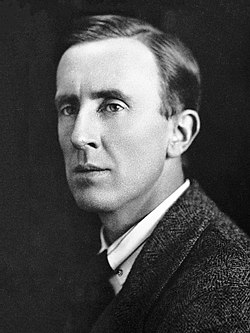J.R.R. Tolkien Quote
Instead of a Dark Lord, you would have a queen, not dark but beautiful and terrible as the dawn! Tempestuous as the sea, and stronger than the foundations of the earth! All shall love me and despair!
J.R.R. Tolkien
Instead of a Dark Lord, you would have a queen, not dark but beautiful and terrible as the dawn! Tempestuous as the sea, and stronger than the foundations of the earth! All shall love me and despair!
Related Quotes
It is for your own good to love a dare-devil rather than a holy coward. A dare-devil is a unique devil, battling your fears, your pains, conquering your uncertainties, carrying you his arms, and flyin...
Michael Bassey Johnson
Tags:
battle, conqueror, corrosive, cowardice, dare devil, despair, dread, dreadful, equanimity, fear
Somewhere, somehow, maybe I can find someone who can make my heart beat again.. For everyday that I pine for your love, and for every single time you reject me, I start to die deep inside.. That throb...
Laarni Venus Marie
Tags:
affection, bitterness, darren, despair, distance, frustration, heartache, hopelessness, love, loving him
We have created a manic world nauseous with the pursuit of material wealth. Many also bear their cross of imagined deprivation, while their fellow human beings remain paralyzed by real poverty. We dro...
Anthon St. Maarten
Tags:
buying, consumer culture, consumerism, consumption, deprivation, desert, despair, emptiness, excess, happiness
About J.R.R. Tolkien
John Ronald Reuel Tolkien (, 3 January 1892 – 2 September 1973) was an English writer and philologist. He was the author of the high fantasy works The Hobbit and The Lord of the Rings.
From 1925 to 1945 Tolkien was the Rawlinson and Bosworth Professor of Anglo-Saxon and a Fellow of Pembroke College, both at the University of Oxford. He then moved within the same university to become the Merton Professor of English Language and Literature and Fellow of Merton College, and held these positions from 1945 until his retirement in 1959. Tolkien was a close friend of C. S. Lewis, a co-member of the informal literary discussion group the Inklings. He was appointed a Commander of the Order of the British Empire by Queen Elizabeth II on 28 March 1972.
After Tolkien's death his son Christopher published a series of works based on his father's extensive notes and unpublished manuscripts, including The Silmarillion. These, together with The Hobbit and The Lord of the Rings, form a connected body of tales, poems, fictional histories, invented languages, and literary essays about a fantasy world called Arda and, within it, Middle-earth. Between 1951 and 1955 Tolkien applied the term legendarium to the larger part of these writings.
While many other authors had published works of fantasy before Tolkien, the tremendous success of The Hobbit and The Lord of the Rings ignited a profound interest in the fantasy genre and ultimately precipitated an avalanche of new fantasy books and authors. As a result he has been popularly identified as the "father" of modern fantasy literature and is widely regarded as one of the most influential authors of all time.
From 1925 to 1945 Tolkien was the Rawlinson and Bosworth Professor of Anglo-Saxon and a Fellow of Pembroke College, both at the University of Oxford. He then moved within the same university to become the Merton Professor of English Language and Literature and Fellow of Merton College, and held these positions from 1945 until his retirement in 1959. Tolkien was a close friend of C. S. Lewis, a co-member of the informal literary discussion group the Inklings. He was appointed a Commander of the Order of the British Empire by Queen Elizabeth II on 28 March 1972.
After Tolkien's death his son Christopher published a series of works based on his father's extensive notes and unpublished manuscripts, including The Silmarillion. These, together with The Hobbit and The Lord of the Rings, form a connected body of tales, poems, fictional histories, invented languages, and literary essays about a fantasy world called Arda and, within it, Middle-earth. Between 1951 and 1955 Tolkien applied the term legendarium to the larger part of these writings.
While many other authors had published works of fantasy before Tolkien, the tremendous success of The Hobbit and The Lord of the Rings ignited a profound interest in the fantasy genre and ultimately precipitated an avalanche of new fantasy books and authors. As a result he has been popularly identified as the "father" of modern fantasy literature and is widely regarded as one of the most influential authors of all time.
